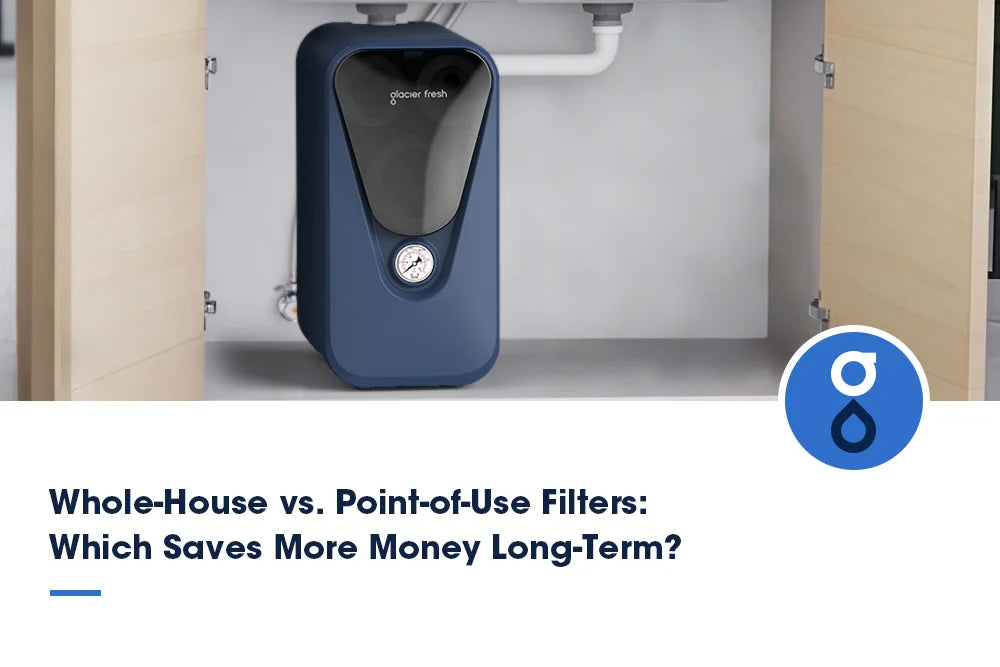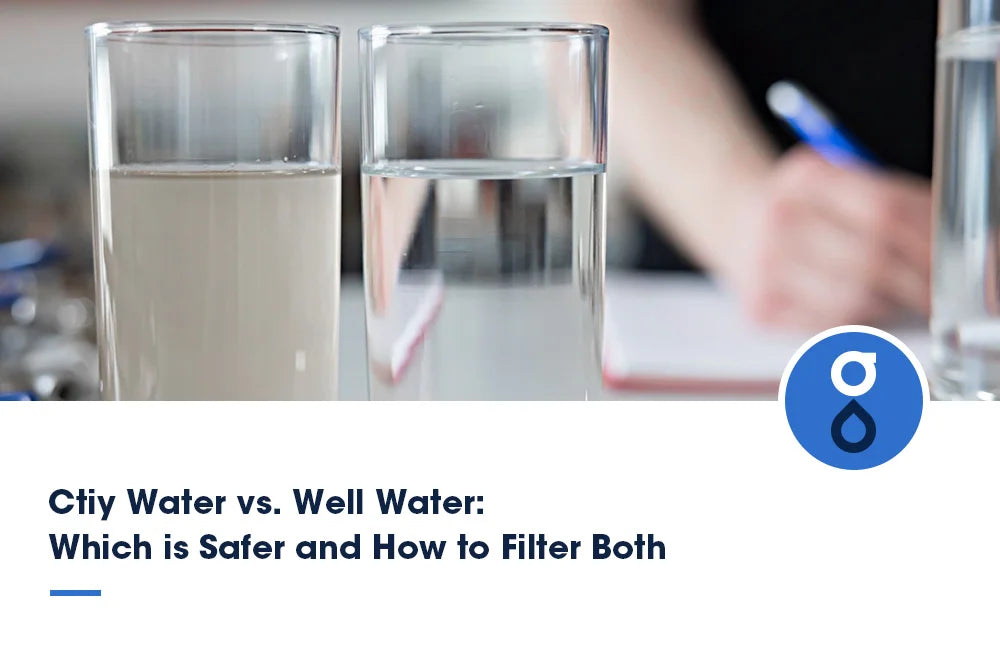Table of Contents:
Understanding point-of-use water filters
Understanding whole-house water filters
Whole-house vs. point-of-use: comprehensive comparison
Real-world scenarios: which system makes more sense?
Which option saves more money long-term?
FAQs
Conclusion
Clean water isn’t just a luxury—it’s a necessity. Whether you're drinking it, bathing in it, or using it for cooking and cleaning, the quality of your water directly impacts your health, home, and budget. With growing concerns about contaminants like chlorine, heavy metals, and microplastics, water filtration has become a priority for many homeowners.
But the question remains: Should you invest in a whole-house water filtration system or stick with point-of-use (POU) filters? More importantly, which option saves more money in the long run? Let's dive into the details.
Understanding point-of-use water filters
 Point-of-use filters are installed directly at the location where water is used—like under your kitchen sink, on a showerhead, or inside a refrigerator. These filters focus on specific uses, such as drinking, cooking, or bathing.
Point-of-use filters are installed directly at the location where water is used—like under your kitchen sink, on a showerhead, or inside a refrigerator. These filters focus on specific uses, such as drinking, cooking, or bathing.
Common types include:
- Faucet filters
- Under-sink reverse osmosis systems
- Refrigerator filters
- Shower filters
Average upfront cost per unit: $40 to $300
Maintenance: Filter replacements every 2–6 months, depending on type and usage
POU systems offer flexibility and affordability, but covering the entire home typically requires installing multiple filters.
Understanding whole-house water filters
A whole-house water filtration system, also known as a point-of-entry filter, is installed at the main water line and treats all water that enters your home. This means every tap, shower, and appliance receives filtered water. These systems typically target sediment, chlorine, iron, and other common contaminants that can affect water quality, odor, and even appliance longevity.
Average upfront cost: $800 to $3,000 (equipment and installation)
Maintenance: Replace filters every 6–12 months; system lifespan 10–20 years
Whole-house systems are ideal for homeowners who want a comprehensive solution with minimal daily upkeep.
Whole-house vs. point-of-use: comprehensive comparison
Initial cost comparison
Regarding upfront costs, POU filters appear cheaper—at first glance.
| System Type | Equipment Cost | Installation | Total Upfront |
|---|---|---|---|
| Whole-House Filter | $600–$2,000 | $200–$1,000 | $800–$3,000 |
| POU Filters (4 units) | $40–$300 each | Mostly DIY | $160–$1,200 |
While point-of-use systems require less initial investment, the cost starts to climb when you factor in multiple units to cover a whole household.
Maintenance & replacement costs over time
Whole-house systems require fewer touchpoints for maintenance. Filters are typically replaced once or twice a year; some systems even have self-cleaning features. On the other hand, POU filters need more frequent replacements. For example:
- Refrigerator filters: every 6 months
- Faucet filters: every 2–3 months
- Shower filters: every 6 months
- RO systems: membranes and filters every 6–12 months
Over five years, these replacement costs can add up—especially for large families.
Water usage & efficiency
Whole-house filters treat all water entering your home—including water used for laundry, toilet flushing, and outdoor use. While that may seem excessive, it ensures that contaminants like chlorine or hard minerals don’t impact your plumbing or skin.
POU filters, however, target only where filtered water is truly needed. This makes them more efficient for specific tasks like drinking and cooking. A POU system might be all you need if you're mostly concerned with taste and odor.
Value beyond dollars
Health: Both systems improve water quality, but whole-house filters offer broader health benefits, especially for those with allergies, asthma, or skin sensitivities. Chlorine vapors from showers can irritate the skin and lungs—something POU drinking filters can’t address.
Convenience: Managing multiple POU filters means tracking various replacement schedules. Whole-house systems are more "set-it-and-forget-it."
Appliance protection: Whole-house filters reduce sediment and scale buildup in water heaters, dishwashers, and washing machines. This can extend appliance life and prevent costly repairs, an often overlooked area of long-term savings.
Real-world scenarios: which system makes more sense?
-
Small apartment or budget-conscious homeowner:
POU filters are budget-friendly and ideal for renters or smaller spaces. A basic under-sink filter and showerhead unit can cost under $150. -
Large family home with well water:
A whole-house system is better suited for homes that address multiple contaminants throughout the entire property, especially with well water. -
Health-focused household:
For families with infants, elderly members, or those with chronic health conditions, whole-house filtration ensures consistent, clean water at every tap.
Which option saves more money long-term?
It depends. While point-of-use filters have lower startup costs, they can become more expensive in the long run due to the need for multiple units and frequent filter changes. Though more costly upfront, whole-house systems often provide better value over time through reduced maintenance, added appliance protection, and convenience.
Choose a Whole-House System If:
- You want low-maintenance, full-home protection
- You’re dealing with hard water or multiple contaminants
- You plan to stay in your home long-term
Choose Point-of-Use Filters If:
- You’re on a tight budget or renting
- You only care about drinking and cooking water
- You don’t mind maintaining multiple units
FAQs
Q1: Can I combine both systems?
A: Absolutely! Many use a whole-house filter for general protection and a POU filter (like reverse osmosis) at the kitchen sink for ultra-purified drinking water.
Q2: Are subscription services for filters worth it?
A: They can be! Filter subscription services ensure timely replacements and may offer discounts on bundles.
Conclusion
Water filtration is an investment in your health and home, but which system is the smarter financial choice in the long term? While POU filters can meet basic needs on a budget, whole-house systems offer better value, protection, and convenience over time—especially for larger households or those with specific water quality concerns.
Before you decide, test your water and consider your lifestyle. A clear picture of your needs will help you make a confident, cost-effective choice. Follow Glacier Fresh to find more water filtration solutions.

















